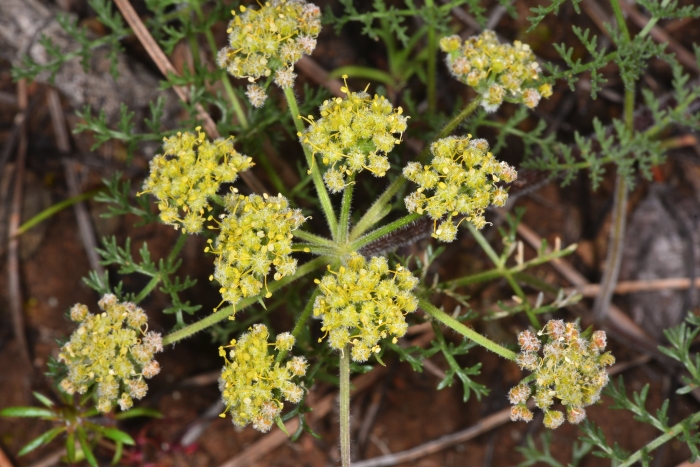Woollyfruit Desertparsley
(Lomatium dasycarpum)
Woollyfruit Desertparsley (Lomatium dasycarpum)
/
/

Don Loarie
CC BY 2.0
Image By:
Don Loarie
Recorded By:
Copyright:
CC BY 2.0
Copyright Notice:
Photo by: Don Loarie | License Type: CC BY 2.0 | License URL: https://creativecommons.org/licenses/by-sa/2.0/ | Uploader: loarie | Publisher: Flickr |





















































Estimated Native Range
Summary
Lomatium dasycarpum, commonly known as Woollyfruit Desertparsley, is a semi-deciduous perennial herb native to the open woodlands, grasslands, and chaparral regions of California, particularly in the Coast Ranges and the Sierra Nevada foothills, as well as Baja California. It typically grows up to 24 centimeters in height, with finely dissected leaves that give it a delicate, feathery appearance. The plant produces an inflorescence that is an umbel of small, hairy greenish or purplish flowers, which bloom from March to May. The flowers are followed by distinctive woolly, flattened, disc-like fruits that can be up to 2 centimeters long and are quite noticeable when mature.
Woollyfruit Desertparsley is valued for its drought tolerance and its ability to thrive in full sun with minimal water, making it an excellent choice for xeriscaping and native plant gardens. Its unique fruit adds textural interest to the garden, and the plant can serve as a food source for local wildlife. In cultivation, it is best suited to well-drained soils and can tolerate a range of soil types, from sandy to loamy. While it is not commonly found in cultivation, it can be used in naturalistic plantings and restoration projects. Care should be taken to avoid overwatering, as it is adapted to dry conditions.CC BY-SA 4.0
Woollyfruit Desertparsley is valued for its drought tolerance and its ability to thrive in full sun with minimal water, making it an excellent choice for xeriscaping and native plant gardens. Its unique fruit adds textural interest to the garden, and the plant can serve as a food source for local wildlife. In cultivation, it is best suited to well-drained soils and can tolerate a range of soil types, from sandy to loamy. While it is not commonly found in cultivation, it can be used in naturalistic plantings and restoration projects. Care should be taken to avoid overwatering, as it is adapted to dry conditions.CC BY-SA 4.0
Plant Description
- Plant Type: Herb
- Height: 0.4-1.3 feet
- Width: 0.6-1.3 feet
- Growth Rate: Moderate
- Flower Color: Yellow, Green
- Flowering Season: Spring
- Leaf Retention: Semi-Deciduous
Growth Requirements
- Sun: Full Sun
- Water: Low
- Drainage: Medium, Fast
Common Uses
Bee Garden, Butterfly Garden, Drought Tolerant, Low Maintenance
Natural Habitat
native to the open woodlands, grasslands, and chaparral regions of California, particularly in the Coast Ranges and the Sierra Nevada foothills, as well as Baja California
Other Names
Common Names: Woolyfruit Desertparsley
Scientific Names: , Lomatium dasycarpum, Peucedanum jaredii, Cogswellia jaredii,
GBIF Accepted Name: Lomatium dasycarpum (Torr. & Gray) J.M.Coult. & Rose